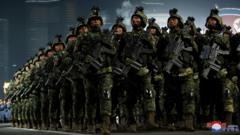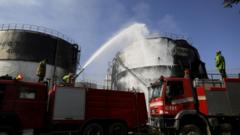With Russia recently launching a series of attacks on Ukraine's energy infrastructure, the country faces a bitter winter. Engineers work tirelessly to maintain power systems, while residents adapt through community-driven solutions, showcasing resilience amid adversity.
Ukraine's Resilience Amidst Winter's Chills and Attacks on Energy Infrastructure

Ukraine's Resilience Amidst Winter's Chills and Attacks on Energy Infrastructure
As Russia intensifies its strikes on Ukraine's power facilities, citizens and engineers adapt to dire conditions with innovation and community efforts.
As Ukraine braces for another harsh winter, the specter of Russian air strikes looms large, targeting the nation's energy infrastructure. The scene at one damaged thermal power station reveals not only the harsh realities of the current conflict but also the resilience and adaptability of the Ukrainian people.
Following a series of devastating aerial assaults, engineers at the facility are engaged in a relentless race against time, working under difficult conditions to repair equipment damaged by recent attacks. With strict security protocols in place, details regarding the specific damage and operational status of the plant remain undisclosed for safety reasons. Strategic Russian strikes have previously resulted in a significant loss of generation capacity, amounting to 9 GW even before the onset of the most recent attacks on November 17.
As winter temperatures drop, those responsible for maintaining Ukraine's power supply express frustration at their inability to execute comprehensive repairs. Oleksandr, an engineer, highlighted the grim cycle of destruction: "We don’t even have time to restore the main equipment, let alone the roof and walls," he remarked. This endless struggle is reflected throughout the country, where energy infrastructure continually comes under threat.
Support from Ukraine's Western allies, including recent funding from the European Commission and U.S. government aimed at aiding energy restoration, has not alleviated the burden faced by these workers. In the parallel battle occurring across the nation, citizens are adapting to energy shortages by utilizing generators, batteries, and solar panels, forming a sense of community in the process.
Urban areas, despite power cuts, remain active as residents invest in innovative solutions. In a high-rise building in Kyiv, for example, residents teamed up to install a backup system, enabling vital functions such as elevator access and hot water. With power cuts an ongoing concern, using mobile apps to track outages has become a daily norm for many.
As the energy struggle instigates community cohesion, Ukrainian filmmakers also capture the mores of urban life amid ongoing crises. The upcoming film “Zbory OSBB” lampoons the negotiations among residents regarding the purchase of communal generators, reflecting the everyday realities and humor that emerges even in challenging times.
Ivan Melashenko, the film’s writer and producer, noted that the backdrop of war informs the narrative, while also providing space for positive representation amidst adversity. “It’s impossible to live in such dramatic and stressful conditions for three years without any positive emotions,” he acknowledged.
In this ongoing conflict, the commitment of engineers and the spirit of the community stand as testament to Ukraine’s unwavering resilience in the face of relentless assaults, as citizens strive to keep the lights on against all odds.





















